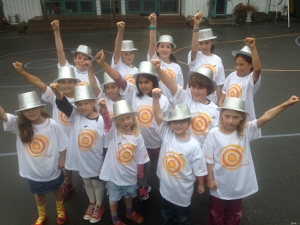
“Schoolgen links sustainability and energy conservation into a school-wide curriculum delivery programme and Clifton Terrace Model School has totally embraced the Schoolgen programme with some impressive learning milestones,” she says.
The inner-city Wellington school, which has a roll of 70, has a strong history in environmental education dating as far back as 2001. In 2009 it was selected to join the Schoolgen programme and receive free solar panels from Genesis Energy.
“The Genesis Energy solar panels option was an amazing offer and it gave the school an onsite educational resource, allowing the children to view the live solar data every day and see how much electricity their school was generating from solar,” co-principal Jenny Austin says.
In 2013, it became the first school to be awarded the Schoolgen Super Solar Bronze Award. This was followed in 2014 by the Schoolgen Super Solar Silver Award – Clifton Terrace Model School was the first school to receive both the Super Solar Bronze and Silver Awards and was rewarded with a new 4 kW solar panel array in addition to its existing 2 kW array.
Schoolgen schools prepare an annual Schoolgen Annual Report that collates not only an historical record of their story with solar, but also provides detailed reporting of how the learning about solar energy and energy efficiency has been integrated into the curriculum.
Clifton Terrace Model School also embraced the Schoolgen competition to design a ‘Mean Green House’. For their winning entry in 2013 the students researched house design and the efficient use of energy, including insulation. The competition requires the students to create a 3D model of the house and produce a video explaining how they developed it. The video can be viewed on the Schoolgen website www.schoolgen.co.nz.
The Schoolgen link to their school’s science implementation plan can also be viewed at www.ctms.school.nz. The school continues to share its environmental activities with the community, locally and internationally, through blogs and other videos.
“The Schoolgen website has the best live solar data from schools across New Zealand. It also links with Australian Solar Schools and students can compare data with up to five schools at a time from both countries,” Ms Twaddle says.
“The Schoolgen e-books, with character voice-overs, enable all students, even the very young to start learning about solar energy and energy efficiency in a fun way.”
Teachers in Schoolgen schools have to take the key concepts of solar energy on board as well, and they often learn as much as their students, with words like photovoltaic – the solar panels which turn sunlight into electricity – entering the school vocabulary.
A driving force behind the Clifton Terrace Model School’s ongoing commitment to sustainability has been lead teacher Katrina Laurie, who joined the school in 2011.
“We have integrated science and technology into our curriculum and we are lucky to have had Katrina to pick up the Schoolgen lead teacher role and work with our other staff to integrate these subjects,” Ms Austin says.
Ms Laurie: “Primary school teachers need to be versatile across the curriculum, and when I started and was given the role of Schoolgen lead teacher it was another step for me to become familiar with this aspect of the school’s environmental education programme.
“To me, that’s the magic of a small school. It’s easy to get the students’ buy-in. They already had a lot of ownership from when they became an Enviroschool and joined the Schoolgen programme. Every child had a good understanding of the philosophy of sustainability.”
Children who have a particularly strong interest in environmental concerns join the Schoolgen lead team, which is made up of students from across the school at all levels up to year 8. New students coming into the school develop their skills and learning about solar and energy efficiency from the Schoolgen lead team.
The lead team students put initiatives in place, such as signs beside light switches as reminders to turn them off when they are not being used, and they monitor good, energy-saving behaviour. Students who have done well are recognised at assembly.
Schoolgen schools are also encouraged to host neighbouring schools, giving the lead teams the opportunity to share their ideas.
“It’s an exciting opportunity for students to step up, and it’s good for schools that are considering becoming a Schoolgen school to see a model of what great changes can take place in a school,” Ms Laurie says.
Ten schools in the Wellington region joined Schoolgen last year and six more will join this year. Currently, the Schoolgen package is a 4kW solar array. The Wellington City Council provides funding for 1 kW, Genesis Energy provides 2 kW and the school comes up with funding for 1 Kw, so the result is a 4kW array of solar panels.
Genesis Energy covers all other expenses including the cost of installation, the inverter and the educational resources.
An annual ‘Green Day’ is held at Clifton Terrace Model School in Term 4, which gives everyone the opportunity to celebrate the school’s environmental initiatives and achievements. Stations are set up around the school on the energy efficiency theme, with the lead team responsible for organising it.
“Students have said it is their favourite day of the year,” Ms Laurie says.
“Throughout the school there’s a strong sense of trying to make a difference to the environment and that flows through to the students’ homes and therefore out into the community.”
Educators and politicians are trying to address the current teaching shortage through different policy settings.…
Melanie Webber was the president of the secondary school union PPTA Te Wehengarua from 2021…
Wait times for paediatric care is having an impact on young people’s education and the…
Home of the brave, land of the free… except when it comes to books for…
Could a gender achievement gap in maths be due to confidence? Sarah Buckley from the…
The much-delayed English draft curriculum is now out for consultation, generating discussion from teachers.
This website uses cookies.